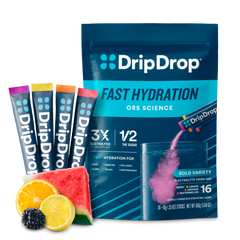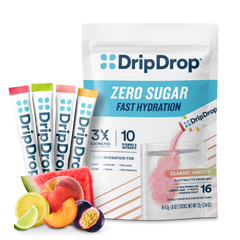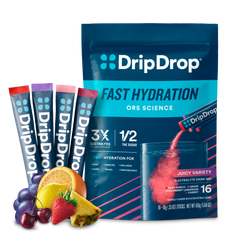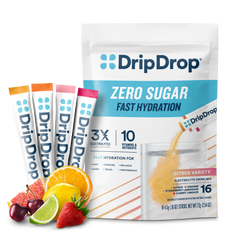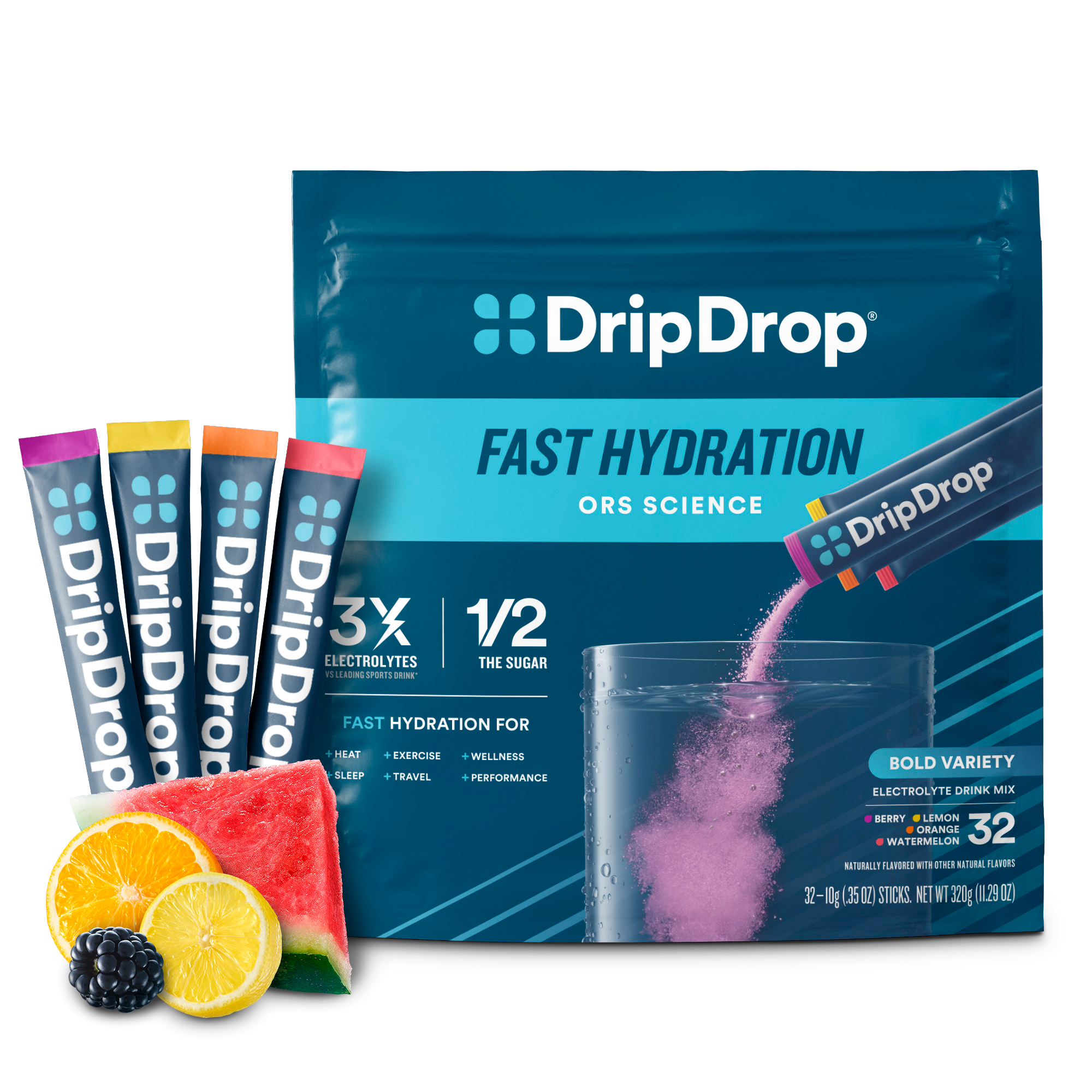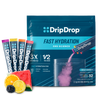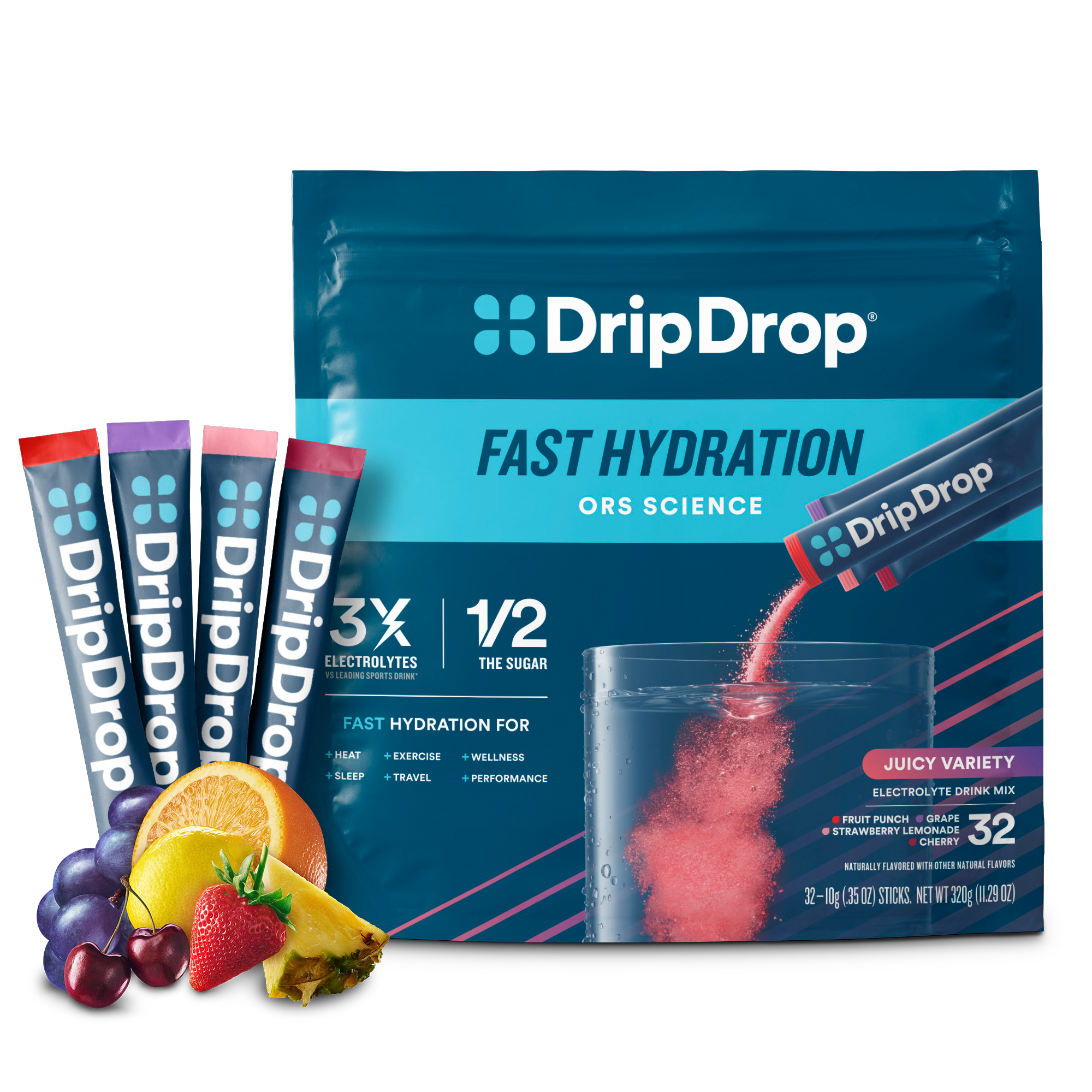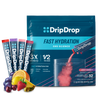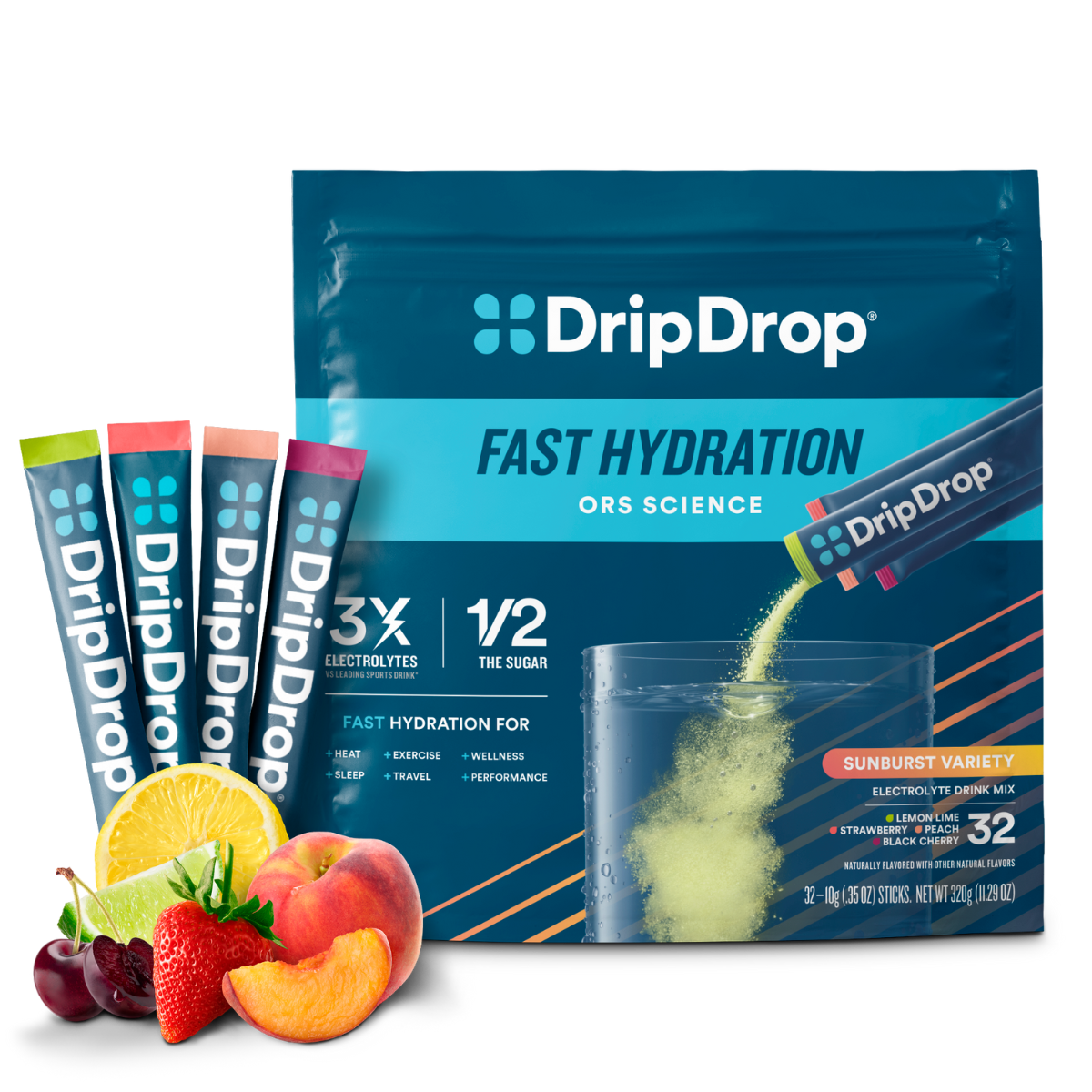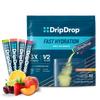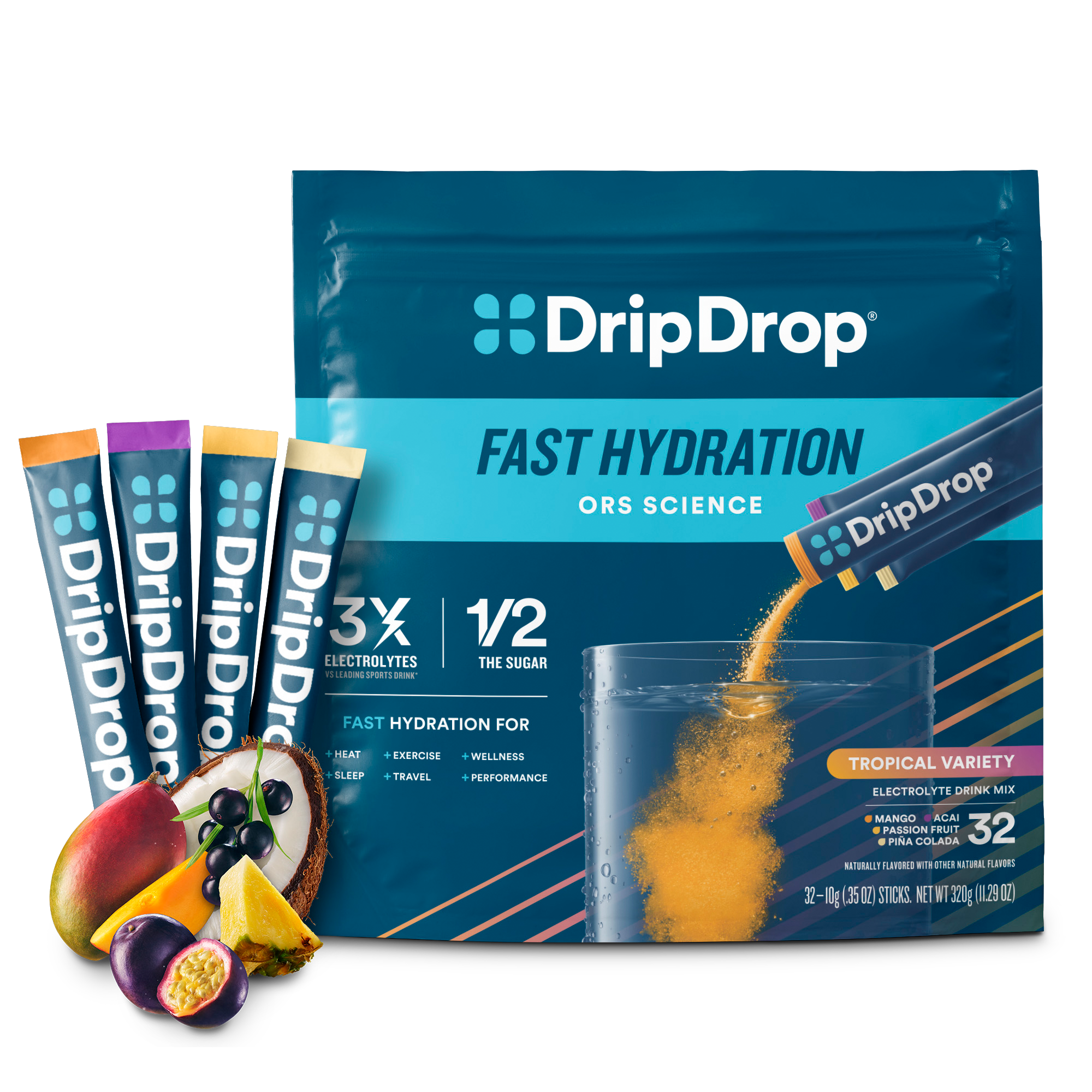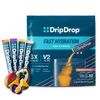Dehydration is a common occurrence that plagues people every day. Your body becomes dehydrated when it loses more fluid and electrolytes than it takes in. Electrolytes are vitamins and minerals, like calcium and magnesium, that fuel essential bodily processes.
Not consuming enough fluids and the proper ratio of electrolytes can impact various aspects of your health, including blood pressure which can also have long-term implications for your organs’ health.
When left untreated, severe dehydration can be life-threatening and should be addressed by a medical professional immediately. For those with underlying medical conditions, dehydration’s effect on blood pressure can result in complications.
Staying hydrated is the best way to avoid dehydration symptoms and associated complications. DripDrop was designed by a doctor on a mission to create the fastest way to hydrate while tasting good. The precise ratio of glucose to electrolytes unlocks a hydration shortcut to help your body absorb fluids and electrolytes quicker.
If you’re wondering, “Can dehydration cause high blood pressure?” let’s explore the connection between dehydration and blood pressure to understand the risks and how to avoid them.
What Is Blood Pressure?
Blood pressure is the measurement of the force of blood against the walls of arteries. It’s measured using two numbers: systolic and diastolic blood pressure. The top number, or systolic blood pressure, indicates the force your blood exerts on arteries when your heart muscle contracts. The diastolic blood pressure, or the bottom number, refers to the force of blood when your heart is in between beats.
Normal blood pressure is around 120/80 mm Hg, according to the American Heart Association. When blood pressure numbers consistently rise above 130/80 mm Hg, you may have hypertension—a condition known as high blood pressure. When blood pressure numbers are lower than 120/80 mm Hg, you have low blood pressure. Both of these conditions can impact your overall health.
Being dehydrated can cause changes in blood pressure, and if left untreated, these changes can become life-threatening. Blood pressure medications and blood pressure conditions are risk factors for dehydration, making it imperative for those taking medication or with blood pressure conditions to stay hydrated at all times.
Not consuming enough fluids does impact blood pressure, but can dehydration cause high blood pressure or low blood pressure? Understanding the cause of high blood pressure and how dehydration impacts cardiovascular health will help answer this question.
Common Causes of High Blood Pressure
Diet: Avoid eating foods that are high in salt, saturated fats, cholesterol, and added sugar. Processed foods and meats are also linked to high blood pressure. Instead, follow a diet rich in whole grains, fruits, and vegetables.
Alcohol: Excessive alcohol consumption can raise blood pressure. It is recommended to limit alcohol intake to moderate levels—up to one drink per day for women and up to two drinks per day for men.
Lack of Exercise: A sedentary lifestyle is more likely to lead to high blood pressure. Regular exercise helps maintain a healthy weight and lowers blood pressure because it can strengthen your heart and blood vessel function.
Stress: Chronic stress can contribute to high blood pressure. Stress management techniques such as meditation, deep breathing exercises, and regular physical activity can help reduce stress levels.
Common Causes of Dehydration
Dehydration is common with millions of Americans experiencing dehydration on a daily basis. Your body requires a combination of water and electrolytes to overcome dehydration and properly function. DripDrop is a doctor-developed formula designed to help your body hydrate fast with the right ratio of electrolytes. Add it to your water to boost hydration and promote fluid absorption.
Illness: Dehydration can occur when you are sick and have diarrhea or are vomiting. During this time, your body loses electrolytes and fluid through the waste system before it’s able to absorb essential fluids in the intestines. The risk of dehydration increases if your illness includes a fever.
Strenuous activity or exposure to heat: You lose fluids and electrolytes through sweat, which is common during strenuous activities in high temperatures or working outside during a heat wave.
Children and older adults have a higher risk: Some people have an increased risk of dehydration. Young children, including infants and babies, are particularly susceptible to dehydration because their low body weight makes them more sensitive to small changes in fluid fluctuations. Older adults are also at higher risk of dehydration as they may not recognize signs quickly.
Underlying health conditions and medications: People with underlying health conditions have a higher risk of blood pressure changes associated with dehydration. These include kidney disease, diabetes, and other disorders that affect blood pressure and blood sugar. Certain medications can also increase the risk of dehydration.
Certain professionals: Athletes, laborers, military service members, and firefighters are also at increased risk of dehydration due to the nature of their jobs.
Diet and alcohol consumption: Diets high in sodium, processed foods, and added sugar can lead to dehydration. Consuming alcohol or caffeinated beverages in high quantities can also cause fluid loss.
The Connection Between Dehydration and Blood Pressure
Understanding the cause behind dehydration and blood pressure provides insight into avoiding both conditions. But can dehydration cause high blood pressure?
Dehydration disrupts your body’s natural fluid and electrolyte balance. When this occurs, you begin exhibiting signs of dehydration, including dark urine, headaches, and thirst.
As the water content in your bloodstream decreases, your blood pressure drops because your blood volume, the amount of fluid in your blood vessels, drops dramatically when you're dehydrated.
In severe dehydration cases, blood pressure may drop so low that your body goes into shock. Shock is a life-threatening condition that occurs when your organs don’t receive enough oxygen, which causes the brain, kidneys, liver, and other organs to stop working properly. If untreated, low blood pressure can cause irreversible damage to cells, tissues, and organs.
One of the best ways to avoid low blood pressure and damage to organs is to avoid dehydration.
Fight Dehydration With DripDrop
Dehydration can be a dangerous condition when it's not addressed probably. Once you’re dehydrated, no amount of water is enough to remedy the situation—your body needs the right balance of electrolytes, too.
DripDrop’s precise ratio of sodium and glucose boosts your body’s ability to absorb fluids and electrolytes, making it the fastest way to hydrate while also tasting delicious. DripDrop has three times the amount of electrolytes as traditional sports drinks, supplying your body with vitamins like zinc, potassium, and magnesium, and just 1/2 the amount of sugar.
For mild to moderate dehydration, DripDrop is a fast way to hydrate. Its convenient packaging is easy to carry anywhere, and the range of delicious flavors make dehydration relief delicious.

